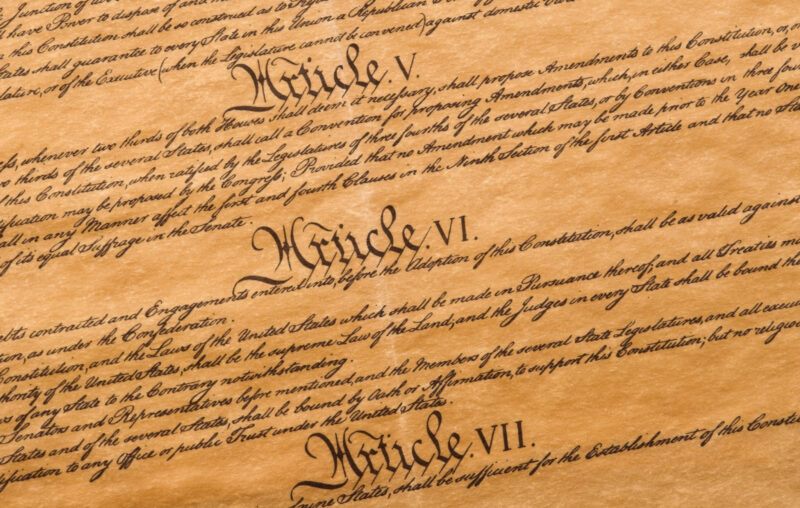Reprinted from Inside Sources
Advocates of holding a new constitutional convention have filed a lawsuit in Texas, asking a federal court to order a constitutional convention to be held in Kansas by January 31, 2023. A U.S. representative has introduced legislation to provide for a convention. The bill will not move forward this year. Still, if convention advocates take control of Congress in November, we could be having our first constitutional convention since 1787 early next year. (Article V gives the president no role in this process.)
How could this be happening?
Our country’s intense, and escalating, political polarization has many Americans longing for a quick, simple solution, something to restore some semblance of normalcy. Unfortunately, people on the left and the right have seized on a constitutional convention as that silver bullet.
Article V of the Constitution requires Congress to call a convention on the application of two-thirds of the states (currently 34). Conservatives imagine a nationwide ban on abortion, a more robust Second Amendment, and a balanced-budget amendment that will force cuts in social programs like unemployment insurance and food assistance. Progressives envision strict campaign finance reform, abolishing the Electoral College, and dumping the Second Amendment outright.
Unfortunately, like so many supposedly “simple” solutions to intractable problems, the Article V convention is too good to be true. Far from being “We the People’s” answer to scheming politicians, a convention would be composed of and run by … scheming politicians.
This is the disturbing conclusion from a survey by the Center for Media and Democracy of the 50 states’ laws on how delegates to an Article V convention would be chosen. In only one state — Rhode Island — would the voters have any role in the selection of the delegates. Everywhere else, it would be up to the state legislature, either alone or in combination with the governor. And when ambitious politicians look for wise and visionary people, they rarely get beyond the nearest mirror.
So it is a bit unrealistic to imagine one collection of the most ambitious politicians from around the country — Congress — will be reined in by another collection of the most ambitious politicians from around the country.
Worse, the politicians would not even be representative of the nation. Major proponents of a convention insist that each state would get one vote, giving the 581,000 people of Wyoming the same influence as the 40 million people of California. The Senate grants each state equal suffrage, but power in the House of Representatives is constitutionally apportioned by population.
The Center for Media and Democracy applied the formulas in the various state laws and found that 31 states’ delegations would be controlled by Republicans, 15 delegations would be controlled by Democrats, and the remaining four would likely have mixed control because some of the bodies the state empowers to choose delegates are controlled by each major party. As former Pennsylvania senator Rick Santorum, a vocal champion of an Article V convention, has said, “We have the opportunity as a result of that to have a supermajority, even though … we may not even be in an absolute majority when it comes to the people who agree with us.”
And in most states, the dominant party would have no obligation to include any members of the other party in its delegation. An Article V convention would look less like the Philadelphia convention of 1787 and more like the Supreme Soviet of 1977.
This two-to-one skew might look like a golden opportunity for conservatives, but it is not. Special-interest money has powered the convention drive. No outsiders know what these interests’ agendas might be. Even the often-inadequate laws seeking to limit special interests’ influence on legislators were not drafted with an eye to a convention.
The threat of a convention seemed to have receded a few years ago after several states rescinded old Article V applications. Rather than acknowledging they could not persuade 34 states to join, however, convention proponents have turned to more and more outlandish theories for how to claim they have support from states that have repeatedly rejected their proposals. Perhaps most absurdly, they insist on counting New York’s 1791 application, seeking a convention to add a bill of rights to the Constitution, as the equivalent of contemporary applications seeking a convention to promulgate a balanced-budget amendment.
In theory, we can hope that any problematic amendments would not be ratified. Once it gets started, however, a convention could disregard the ratification requirements of Article V just as the Philadelphia Convention disregarded the ratification requirements of the Articles of Confederation.
A new constitution enacted through these dishonest and deeply undemocratic means will have many problematic provisions. Even more crucially, it will lack the legitimacy our existing Constitution still has. And that will leave us even more sharply divided.




